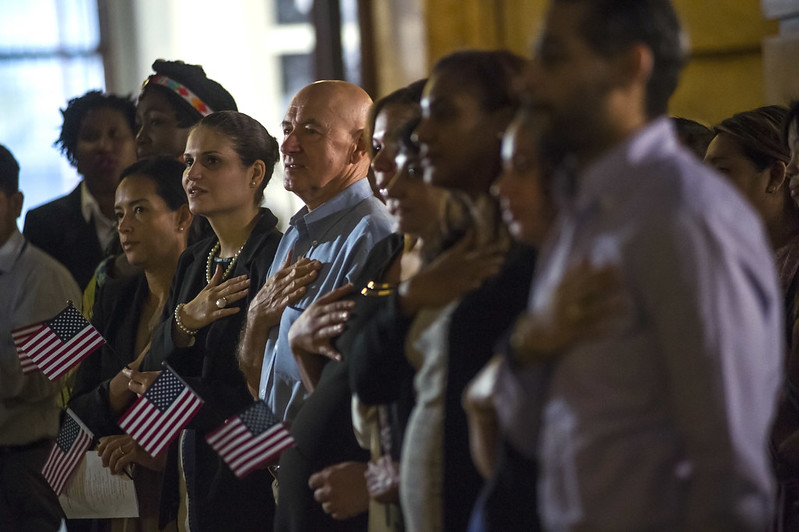
A naturalization ceremony (photo: Ed Reed/Mayoral Photography Office)
The midterm elections are now behind us and the lame-duck session is the perfect time to tackle a long-standing problem: immigration policy. The issue has a profound bearing on most Americans' communities and schools, as well as their economic interests and notions of justice.
Specifically, Democrats must finally codify the rights of Dreamers, those who are beneficiaries of the Deferred Action for Childhood Arrivals (DACA) program, and remedy continuing worker shortages in key industries like agriculture, health care, construction, and manufacturing, where non-citizen labor is ready, willing, and able.
Democrats – who control the House and Senate until January – have a tight window to make this right. And they have bipartisan support among Americans. They should seize the opportunity, effective immediately. 2025 may be too late.
DACA status Americans – the overwhelming majority of whom are young Latinos and Latinas – are foreign-born individuals who came to this country as minors. They are Americans and must enjoy the same rights as all citizens. They have grown up in our communities and places of worship, and in our schools, sports leagues, and civic organizations. They shouldn’t be expected to return to countries that are foreign to them and where their safety is at risk.
In recognition of the hazards posed by repatriating these young people to their countries of origin – most of them nations riddled by authoritarianism, violence, and crime, then-President Barack Obama issued an executive order, enabling DACA youth to remain in the U.S. temporarily to study and work, while legislative efforts could be advanced to provide them permanent resident status and a pathway to citizenship.
In recent years, however, the Trump White House resisted the efforts of DACA status young people to be permanently incorporated into our national life and economy, opposing their permanent residence and a fair process that would allow them to become citizens. Courts, where immigrant-unfriendly judicial appointments have increased, have also stymied efforts to protect DACA status for millions of young people.
Yet 74% of Americans, when polled by the Pew Center, overwhelmingly support making DACA rights permanent.
Further research and evidence finds that 'DACAmented' Americans are remarkably productive and law-abiding – as K-12 and college students, workers and entrepreneurs, and volunteers across the nation – wherever they reside, study or work. Some of these young men and women have also served admirably in the U.S. military.
Congress should resuscitate and pass HR-6. The Act would establish a clear pathway to permanent resident status for DACA beneficiaries, including the right to reside, study, and work in the U.S. It would also prohibit states from denying otherwise eligible DACA youth in-state tuition and benefits at public colleges and universities. California, New York, and five other states now offer tuition assistance for DACA recipients, but all students with DACA status deserve the same tuition benefits as their peers across the nation.
Such action is essential to develop a nationwide pipeline of strong workforce talent that is better aligned with our changing demographics and increasingly global economy.
For similar reasons, effective immediately, Congress should pass legislation to more fully mobilize available noncitizen workers; doing so can help to address persistent labor shortages in critical fields like home health care and child care, and aid various supply chain sectors beset by the recent covid crisis (from agriculture to retail, construction, and technology).
Expanding economic opportunity and agency for the nation’s young, fast-growing, and heavily immigrant Latino workforce is a worthy investment in our nation’s future. Latino students and workers, many of whom are Dreamers and non-citizens, are essential contributors to our evolving multicultural society and economy. We need practical and reasoned policy interventions to activate their still-not-fully-tapped contributions.
The measures we propose here will not provide the comprehensive reforms that are needed to address our nation’s many immigration challenges, but they will establish a practical start that is worthy of bipartisan support in the waning days of the current Congress. The time to act is now.
***
Félix V. Matos Rodríguez is chancellor of City University of New York. Henry A. J. Ramos is senior fellow at The New School Institute on Race, Power and Political Economy.
***
Have an op-ed idea or submission for Gotham Gazette? Email This email address is being protected from spambots. You need JavaScript enabled to view it.




